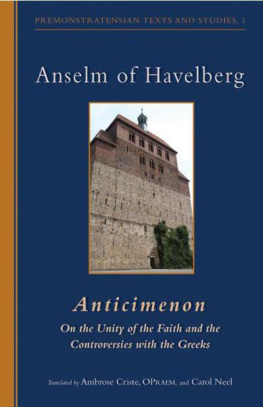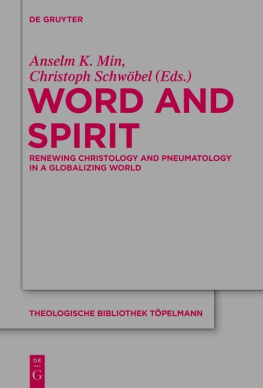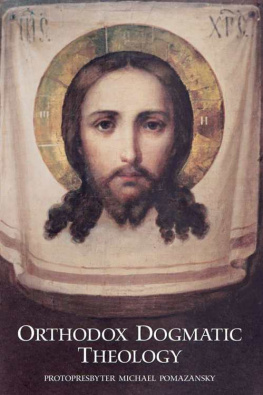2010 by Order of Saint Benedict, Collegeville, Minnesota. All rights reserved. No part of this book may be reproduced in any form, by print, microfilm, microfiche, mechanical recording, photocopying, translation, or by any other means, known or yet unknown, for any purpose except brief quotations in reviews, without the previous written permission of Liturgical Press, Saint Johns Abbey, P.O. Box 7500, Collegeville, Minnesota 56321-7500. Printed in the United States of America.
Anselm, Bishop of Havelberg, d. 1158.
[Dialogi. English]Anselm of Havelberg, Anticimenon : on the unity of the faith and the controversies with the Greeks / translated by Ambrose Criste and Carol Neel.p.cm. (Cistercian studies series ; no. 232) (Premonstratensian texts and studies ; 1)Includes bibliographical references.ISBN 978-0-87907-106-6Ebook ISBN 978-0-87907-961-11. HistoryReligious aspectsChristianity.2. ChurchUnity.
I. Criste, Ambrose.II. Neel, Carol.III. Title.
Contents
Preface
A s president of the editorial board of Premonstratensian Texts and Studies, I introduce the reader to the first volume of our new series with great excitement and pleasure. This series seeks to bring to light primary works and scholarly studies on the history of the religious order founded in the twelfth century by Norbert of Xanten. Our endeavor joins together the work of regular religious maintaining the vital Norbertine tradition with the efforts of professional academics in historical and theological studies, thus affirming the mutual contribution of a lived spirituality and scholarly investigation in bringing to a wide English-speaking audience monuments of European spiritual and religious life that have been little known until now.
That so many of the foundational texts of Premonstratensian history and spirituality have never been translated into English is a serious and unfortunate lacuna, given the prominence of the Order in the articulation of the ideals of the Gregorian reform. The canons regular, among them the Premonstratensians, played a crucial role in the theology and devotional life of the High Middle Ages, and indeed continued to do so until the devastations of the French Revolution. While the most important writings of the canons of the abbey of St. Victor have long been available in English, the same is not true for their fellow Augustinian canons, the Premonstratensians.
This first volume of Premonstratensian Texts and Studies, the Anticimenon of Anselm of Havelberg, represents one of the most interesting and important texts of the whole medieval period, by an author whom the translators rightly name Norberts most devoted, proximate, and successful disciple and most articulate apologist. Anselms treatment of the issues dividing Roman Catholic and Orthodox Christians is unparalleled until, perhaps, the twentieth century in its attempt to offer a fair and thorough presentation of the theological and indeed psychological premises for each side. As Carol Neel and Fr. Ambrose Criste, OPRAEM, demonstrate in their introduction, Anselms nuanced treatment of issues dividing Latin and Greek Christendom is an outgrowth and application of his equally compelling treatment of the issue of historical development and diversity in the church. In stressing the fundamental unity of the argument of the three books that comprise the Anticimenon , the translators eloquently demonstrate how Anselms attempt to point the way forward in Roman Catholic and Orthodox dialogue is part of his larger goal to illuminate for his contemporaries the agency of the Holy Spirit in human time.
Anselms belief is that variety and diversity among Christians sharing the common core of faith is actually a strength and sign of the continuous work of the Holy Spirit among the Christian people rather than being necessarily divisive and problematic. This perspective was hardly typical of his era, but it is a profoundly hopeful message that may well find a receptive audience in our own time. Who can disagree that Christians, divided both within and between the churches, need more than ever to listen to one another in charity and engage one another, eager to discern the works of the Holy Spirit in each others midst? This first volume of Premonstratensian Texts and Studies thus is an auspicious occasion for which we owe a debt of gratitude to Dr. Neel and Fr. Criste and to our collaborators at Cistercian Publications and Liturgical Press. It is truly a moment full of hope that Anselms voice as an advocate of reform and renewal in the church, fully accessible now in English translation for the first time, will provide both an appropriate inauguration and continuing inspiration to all those who will come to seek wisdom from the deep well that is Premonstratensian tradition.
William P. Hyland, PHD
Director, Center for Norbertine Studies
St. Norbert College, De Pere, Wisconsin
September 29, 2008
Michaelmas
Foreword
T his translation has brought together interests and contacts extending over many years. Carol Neel first read Anselm of Havelbergs Anticimenon in the course of her graduate studies in the late 1970s. Ambrose Criste and Neel began working together while the former was a student at Colorado College in the 1990s, but Criste did not himself encounter Anselms great work until after he had entered the authors own religious order, the Premonstratensians, several years later. As a novice, Criste read elements of Anticimenon s Book 1 as translated by Fr. Hugh Barbour, O.Praem., for the novices instruction at St. Michaels Abbey. His interest so piqued, Criste then completed his own translation of Books 1 and 2. Subsequently, during one of Cristes annual visits to Colorado College, he noticed a typewritten translation of Anticimenon s Book 3 on Neels desk. We had been discussing contributions we might respectively make to a planned new series, Premonstratensian Texts and Studies. Development of a polished, publishable English version of this twelfth-century text of mutual interest seemed to us both topically appropriate and a happy opportunity to work together again. Our collaboration on this text has been in this instance at long distance, since Neel was in the United States while Criste continued his own graduate studies in Rome.
We are grateful for the support to Neel, during her 20072008 residency at the Collegeville Institute for Ecumenical and Cultural Research, of the monastic community of St. Johns Abbey for their hospitality; the reference and interlibrary loans staffs of St. Johns Universitys Alcuin Library, especially Stefanie Weisgram, OSB, and Janine Lortz, for their seamless helpfulness; the staff of St. Johns Hill Monastic Museum and Library for access to their rich reference collection and other medievalists tools; colleagues and staff at the Institute for their companionship and interest; Fr. Kilian McDonnell, OSB, the Institutes guiding spirit, for his scholarly and personal model. The Definitory of the Order of Prmontr, Daylesford Abbey, St. Michaels Abbey, St. Norberts Abbey, St. Norbert College, and the Paul Sheffer Memorial Fund for Roman Catholic Studies of Colorado College have supported this project and the initiation of the series in which it is the inaugural volume. To these institutions and the encouragement of the persons who form them we are again grateful.










